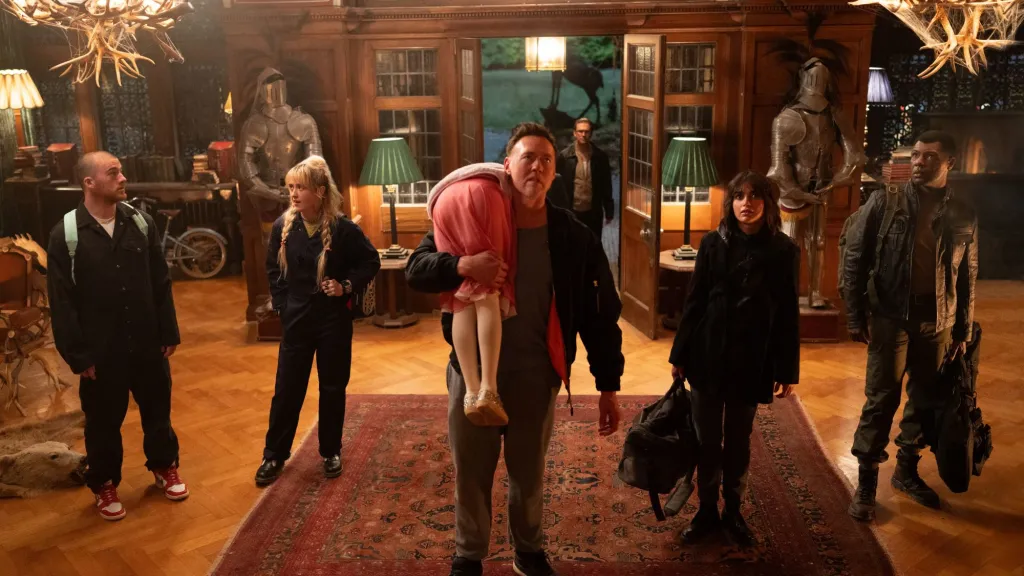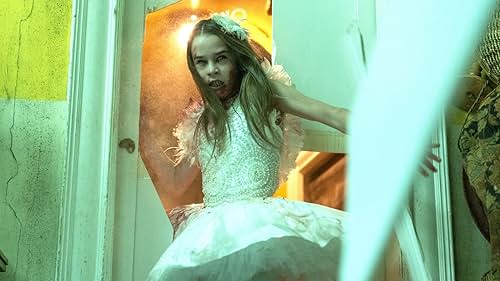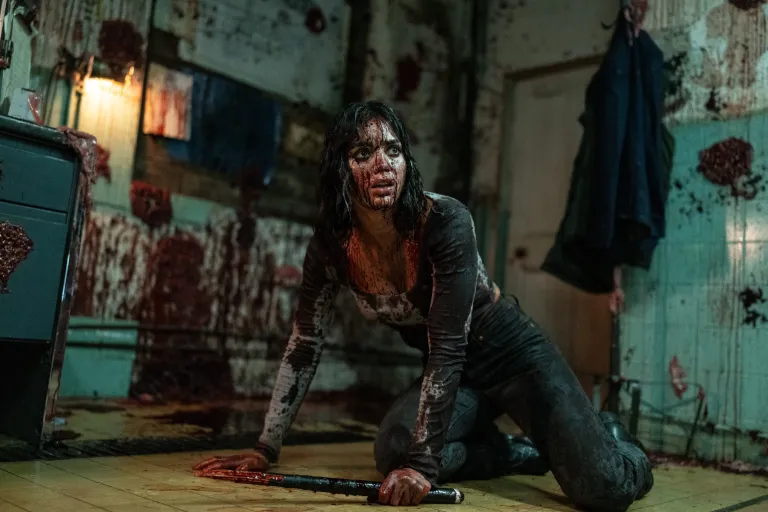Abigail is a perfectly fine movie with a premise that has a neat little twist. The filmmakers embrace the gore and give us characters who may not be the brightest bulbs in the bunch but are, at the very least, smart enough to know when they’re screwed. Luckily, they possess a kind of optimism usually reserved for feel-good family films, making their repeated failures all the more darkly comical.
The directing duo of Matt Bettinelli-Olpin and Tyler Gillett are blessed with the scarce gift of having fun while making sure the audience is having fun as well. Abigail does precisely what it says on the tin: a group of down-and-out criminals is hired to kidnap a wealthy heiress only to discover that the little girl is a vampire named Abigail (Alisha Weir) and that she likes to “play with her food.”

Here’s the part where I wax rhapsodic about Weir and how her performance is the film’s centerpiece. It is, and the fact that she’s so good is a testament to her talent. Her ballet movements show us how in control she is and hint at the centuries of maturity slumbering under her childlike visage.
Working from a script by Stephen Sheilds and Guy Busick, Bettinelli-Olpin, and Gillett don’t dawdle. Using well-worn tropes, they introduce us to our eclectic cast of characters. They even have a scene where Joey (Melissa Barrera) goes around the room dissecting every character like some Holmesian detective despite these skills never coming into play again. Truthfully, that’s part of the charm of Abigail. Shields and Busick populate their monster-heist movie with characters smart enough to know other people are dumb but not smart enough to know how dumb they themselves are.
Well, all except Peter (Kevin Durand). The muscle of the group, he’s a walking himbo who’s easily manipulated and confused. He’s the comedic relief, and while the movie goes to the well one too many times, you can’t help but root for the big lug.
For her part, Barrera throws herself into the role of Joey—often quite literally. Bettinelli-Olpin and Gillet delight in tossing Barrera and Dan Stevens’s Frank, the sleazy, corrupt cop, around the set. If Barrera ever tires of her stint as a Final Girl, she has a real future in action movies, especially in how she took some of those falls.

Next to Weir, Barrera is the other bright light. Granted, it’s not as if Abigail is wanting for talent. Stevens is having a ball as the amoral New York cop gleefully delivers every line with clenched teeth, all the while his perfect jawline covered in blood and viscera. Even Kathern Newton’s Samm, the socialite turned hacker, and Angus Cloud’s sociopathic driver, Dean, have moments to shine.
However, Sheilds and Busick’s script doesn’t give Newton much to do. Newton, who shined in this year’s earlier Lisa Frankenstein, feels slightly left out. That is until one scene involving Abigail using Sammy’s body like a puppet had me shrieking and clapping in the theater. Newton does what she can, but we don’t learn much about her character by design. The problem isn’t that we don’t know much about her; it feels like Newton doesn’t.
Still, Shields and Busick’s script feels like a throwback to the low-budget 90s indie movies. The kind where there was one big star and many up-and-comers in a plot about a group of thugs kidnapping a mob boss. These movies were found on HBO or at your Blockbuster. Like Abigail, they were polished, genre-eque films where charcaters would talk more than they would shoot or kill. Shields and Busick have captured the love of talking from these movies, something missing from so many modern films.
The characters in Abigail talk and talk, and while the dialogue never reaches the heights of David Mamet, it is entertaining. The way they talk about rumors they’ve heard about the crime boss, the wonderfully named Kristoff Lazar, is a clear nod to Kaiser Soze. Characters reveal bits and pieces of themselves as they discuss and debate the veracity of the rumors.
But even more than that, Sheilds and Busick delight in tossing tradition to the winds. Upon learning that Abigail is both a vampire and the daughter of Kristoff Lazar, the kidnappers begin to discuss the ways of how to kill vampires. Refreshingly, Abigail creates its own rules regarding vampirism, and half the fun is seeing what old rules work and which don’t.
Bettinelli-Olpin and Gillett spend much of Abigail inventing new ways to toss Barrera and Stvens around their gorgeously gothic set before covering them in goop. The house where Abigail takes place feels like something from a Hammer film: narrow halls and ostentatious architecture combine to create confusion and claustrophobia. I love how we’re never quite sure what the house’s layout is. Every stairway and hallway feels like a discovery and befits a house seemingly renovated throughout the centuries.
Aaron Morton’s camera does a solid job sitting back and watching the bodies fly and contort. Abigail isn’t a body horror movie, but that doesn’t mean movement and the body don’t play a huge part. Barrera and Weirs in particular. Yet Morton’s lens can capture little moments between the characters, such as the sparks that seem to ignite between Joey and Rickles (Will Catlett).
Rickles dies far too soon for my liking, but as he was the most competent character, it makes sense they kill him off so quickly. Still, the few moments he and Joey have together hint at a much more emotionally vigorous movie. Whether sexual or some other intense connection, Catlett and Barrerra’s chemistry is so potent that I couldn’t help but moan out loud when he shuffled off this mortal coil.

To say nothing of the too-brief stint of the great Giancarlo Esposito as Lambert. Esposito is the kind of actor who knows how to make the best out of the line “And you’re Don Fucking Rickles.” I won’t say that he’s wasted, but more Esposito is never a bad thing.
Abigail is a hoot and a half, but it threatens to overstay its welcome. It also stumbles into various pitfalls, including introducing characters that work better in the shadows, too many endings, and a strained attempt at displaying the bonds of sisterhood. The latter works because of Weir and Barrera’s performance but is hamstrung by Sheilds and Busick’s script.
Still, Abigail manages to be self-aware without name-checking every movie with similar tropes. That alone bumps it up a spot in my book. Abigail is a bloody good time that reminds us that Melissa Barrera should be in more things.
Images courtesy of Universal Pictures
Have strong thoughts about this piece you need to share? Or maybe there’s something else on your mind you’re wanting to talk about with fellow Fandomentals? Head on over to our Community server to join in the conversation!

